A look at the month’s best reviewed crime novels, mysteries, and thrillers.
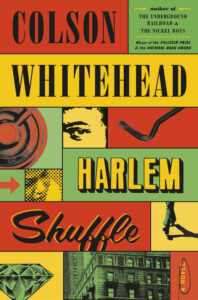
Colson Whitehead, Harlem Shuffle
(Doubleday)
“… dazzling … the language here is wiseguy crisp, zinging with street vernacular … Whitehead flexes his literary muscles further, extending the boundaries and expectations of crime writing … The book is also a social drama interrogating the nature of prejudice and how an environment limits ambition. The nuances of Manhattan’s topography drive much of the action … Part of the book’s pleasure is that it keeps you guessing. By the end, I felt, as Ray does of Harlem: ‘Its effect was unmeasurable until it was gone.'”
–Colin Grant (The Guardian)
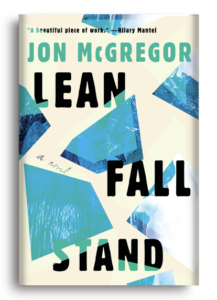
Jon McGregor, Lean Fall Stand
(Catapult)
“… another McGregor novel that, beneath its serene surface, takes huge risks. There is, for example, the wilful front-loading of the action, with that stirring storm sequence giving way to Doc’s agonisingly slow recovery. McGregor has also chosen to have a main character unable to express himself for most of the book. Fortunately, it’s also another McGregor novel that triumphantly gets away with it.”
–James Walton (The Times)
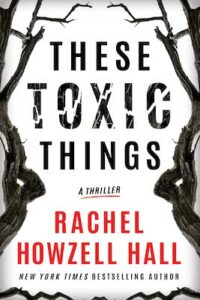
Rachel Howzell Hall, These Toxic Things
(Thomas & Mercer)
“Rachel Howzell Hall infuses her characters with life. They feel like real people with real feelings leading real lives, along with their memories and the memorabilia that enrich them. As the story unfolds, suspense takes over — and with plenty of clues and red herrings, These Toxic Things is a compelling read, as well as a rich addition to the author’s impressive body of work.”
–Barbara Liepkin Gershenbaum (Bookreporter)

Lincoln Michel, The Body Scout
(Orbit)
.”.. blends noir, cyberpunk and sports into something at once timeless and original … Kobo’s love for and grief over his brother animates every page, and the real gravity of those feelings exists in affecting contrast to the glib, corporatized dystopia he inhabits. Michel’s writing is beautiful, too, breathing sophisticated life into stock genre types, and illuminating vast tracts of story with casual wrist-flicks of world building. The Body Scout is a wild ride, sad and funny, surreal and intelligent.”
–Amal El-Mohtar (New York Times)

Allen Eskens, The Stolen Hours
(Mulholland)
“Allen Eskens is able to quietly create characters and stories that sneak up on you, get under your skin and make you think. His latest release, The Stolen Hours, is no exception. Set in his home state of Minnesota, it combines his personal knowledge of the legal system with an outstanding redemption tale … What transpires throughout the book is some brilliant plotting by Allen Eskens. Every time it seems that things are going to work out for Lila, something in the form of a fancy plot twist spoils that optimism. You cannot help but feel for her and the pain she has gone through. A near-perfect thriller, The Stolen Hours is a true nail-biter that will have you reading long into the night.”
–Ray Palen (Bookreporter)

Amanda Jayatissa, My Sweet Girl
(Berkley)
“But the exploration of Paloma’s identity and character is what really drew me to this book and has me thinking about it long after I turned the final page … It’s thoughtful and engaging, but also quite profound. It’s hard to believe this novel is a debut, but it makes me incredibly excited to see what Jayatissa does next, as she has a bright future ahead of her.”
–Swapna Krisha (NPR)
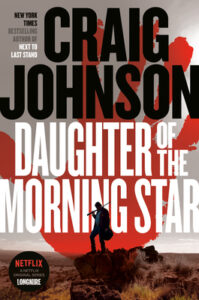
Craig Johnson, Daughter of the Morning Star
(Viking)
“… riveting … Writing from Longmire’s point of view for the entirety of this fast-paced mystery, Johnson uses crisp prose and sharp dialogue to create a sense of immediacy as the investigation moves toward its inevitable, thrilling conclusion. The case also allows Johnson to incorporate horrifying statistics about how young Native American women are substantially more likely to be murdered, to be sexually assaulted or to commit suicide than the national average. Longmire knows that what happened to Jeanie and what’s threatening Jaya lie anywhere along that spectrum, and that’s what scares him. As readers, you’ll be scared too.”
–G. Robert Frazier (Bookpage)

Karen Cleveland, You Can Run
(Ballantine)
“.. a true rollercoaster ride of a novel that kicks off immediately with a heart-pounding event and never lets go until the very end … The final third of You Can Run is a non-stop series of events that utilizes all of Karen Cleveland’s counterterrorism training. She also has some nice plot twists up her sleeve, including a big one that she reveals on the novel’s last page.”
–Ray Palen (Bookreporter)

William McIlvanney, The Dark Remains: A Laidlaw Investigation
(World Noir / Europa)
“… a standout, lyrically bleak novel … the writing here is so sharp nearly every sentence could split open a haggis. (And I defy even the most ardent fans of McIlvanney and Rankin to determine which man wrote which passages.) … The doctrine of social class as predestination has rarely been presented so succinctly. The distinct appeal of The Dark Remains, of course, is that it allows us readers to encounter the McIlvanney’s philosopher-detective before he hardened a granite legend … The solution to the mystery of ‘Who killed Bobby Carter?’ is agreeably unexpected, but, as in so many excellent crime stories, by the time it emerges, many of us readers will be hazy on what set this investigation in motion in the first place. The point is the journey, to savor walking down the mean streets of 1970s Glasgow once again with the stoic Laidlaw.”
–Maureen Corrigan (The Washington Post)
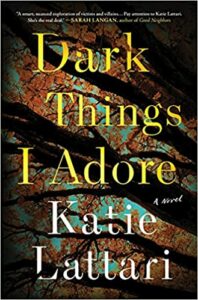
Katie Lattari, Dark Things I Adore
(Sourcebooks)
“[Dark Things I Adore] is one of the most interesting psychological thriller tales of revenge I have read in quite some time … The last third of Dark Things I Adore is a nerve-wracking ride that opens up more and more revelations about Max, Audra and her mother. It makes for some great page turning as you eagerly will race through the book to see how everything wraps up.”
–Ray Palen (Bookreporter)


















